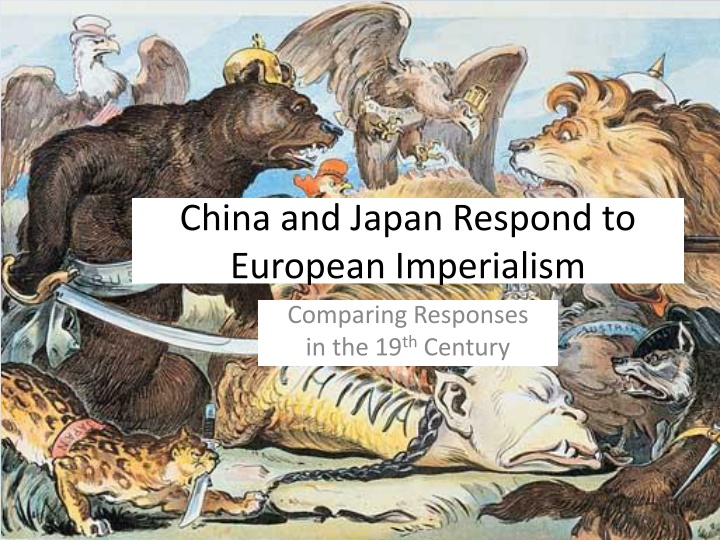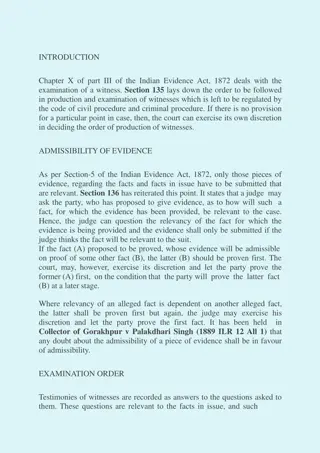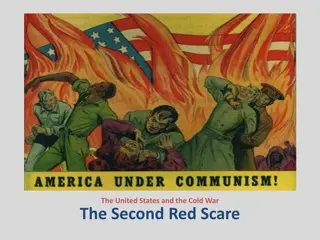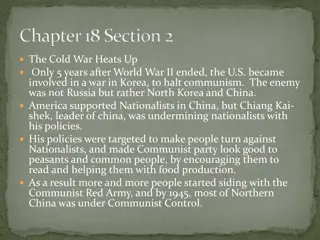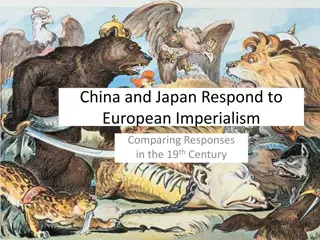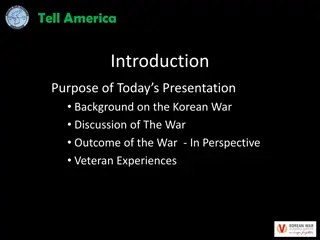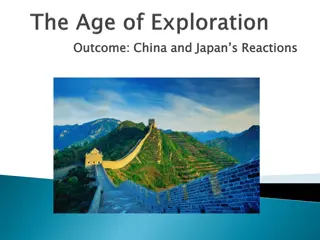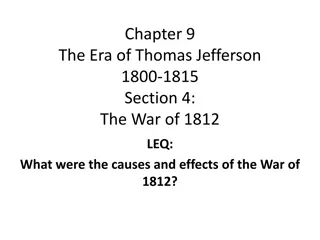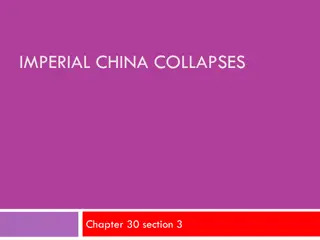The Opium War and Its Impact on China: A Historical Examination
The Opium War was a pivotal event in 19th-century China, leading to the signing of the unequal Treaty of Nanjing with Britain. This conflict stemmed from political, economic, and social factors, including the decline of the Qing Dynasty, the British East India Company's opium trade, and the Qing government's attempts to ban opium imports. Explore the various contexts surrounding this significant historical event.
Download Presentation

Please find below an Image/Link to download the presentation.
The content on the website is provided AS IS for your information and personal use only. It may not be sold, licensed, or shared on other websites without obtaining consent from the author.If you encounter any issues during the download, it is possible that the publisher has removed the file from their server.
You are allowed to download the files provided on this website for personal or commercial use, subject to the condition that they are used lawfully. All files are the property of their respective owners.
The content on the website is provided AS IS for your information and personal use only. It may not be sold, licensed, or shared on other websites without obtaining consent from the author.
E N D
Presentation Transcript
http://wps.pearsoncustom.com/wps/media/objects/2426/2484749/chap_assets/images/image24_2.jpghttp://wps.pearsoncustom.com/wps/media/objects/2426/2484749/chap_assets/images/image24_2.jpg China and Japan Respond to European Imperialism Comparing Responses in the 19thCentury
Dramatic Moment: The Opium Wars results in the Treaty of Nanjing After three years of naval warfare(1839-1842), the Treaty of Nanjing is signed in 1842 between Great Britain and the Qing rulers of China It was the first so-called unequal treaty It opened coastal trading ports to officials, merchants, and missionaries It also granted extraterritoriality British residents were not subject to Chinese laws. Treaties with France, Russia, Germany, and the United States followed
Why did the Opium War happen? Why did the Chinese lose? Event Political Context Economic Context Social /Cultural Context
The Political Context File:The Ci-Xi Imperial Dowager Empress (5).JPG Decline of the Qing Dynasty Manchu Dynasty 1644- 1911) Empress Dowager Cixi clings to power (retaining her position is her main concern) Photo Source: http://puyi.netor.com/gallery
Economic Context: Opium British East India Company develops opium trade from India to south China (1700s) The BEIC had a royal charter and (eventually) a monopoly on opium which was plentiful in the Bengal region of India (after the British victory in 1757 at the Battle of Plassey) A commodity to balance the trade of tea, silk and porcelain (instead of paying in silver/gold) Trade is restricted to (only) the port of Guangzhou British ideology of free-market capitalism; pressures for more access to ports 1729 200 chests of opium/year 1800 4,500/year 1838 40,000 chests/year
The Qing Ban Opium Imports, 1799 Despite bans, the opium trade continued; in response, the government issued the following decree in 1810: Opium has a harm. Opium is a poison, undermining our good customs and morality. Its use is prohibited by law. . . . However, recently the purchasers, eaters, and consumers of opium have become numerous. Deceitful merchants buy and sell it to gain profit. The customs house at the Ch'ung-wen Gate was originally set up to supervise the collection of imports (it had no responsibility with regard to opium smuggling). If we confine our search for opium to the seaports, we fear the search will not be sufficiently thorough. We should also order the general commandant of the police and police- censors at the five gates to prohibit opium and to search for it at all gates. If they capture any violators, they should immediately punish them and should destroy the opium at once. As to Kwangtung and Fukien the provinces from which opium comes, we order their viceroys, governors, and superintendents of the maritime customs to conduct a thorough search for opium, and cut off its supply. They should in no ways consider this order a dead letter and allow opium to be smuggled out!
Cultural Context Chinese attitudes Confucian beliefs hold merchants in low esteem Superiority Belief that they are the Middle Kingdom Consider all foreigners barbarians Trade was through the tributary system which forced all nations to kowtow and pay tribute in order to be granted trading privileges http://presidential-candidates.org/data/images/china.jpg
Social Context Huge number of Chinese people become addicted to opium The emperor appoints Lin Zexu imperial commissioner for trade in the 1830s Restricts imports (1729) Provides services to rehabilitate addicts Tries to confiscate and destroy opium, 1838 1839, he publishes an open letter to Queen Victoria http://www.environmentalg raffiti.com/history/news- incredible-images-19 Photo Source: http://www.environmentalgraffiti.com/history/news- incredible-images-19th-century-opium-dens
File:Destroying Chinese war junks, by E. Duncan (1843).jpg Military Context The East India Company iron steam ship Nemesis, commanded by Lieutenant W. H. Hall, with boats from the Sulphur, Calliope, Larne and Starling, destroying the Chinese war junks in Anson's Bay, on 7 January 1841 Source: http://ocw.mit.edu/ans7870/21f/21f.027/opium_wars_01/ow1_gallery/pages/1841_0792_nemesis_jm_nmm.htm
Effects of Opium War & Treaty of Nanjing Internal Unrest Taiping Rebellion (1850s-1870s) Leader: Hong Xiu-quan Claimed to see visions of Jesus brother; Prophesized a heavenly kingdom in China Revolt plays on discontent with corruption, inability to resist foreigners. Though eventually put down, this rebellion showed how ineffective the Qing army was Continued External Pressure Second Opium Wars (1850s) opens more ports to British and French Unequal Treaties Century of Humiliation Spheres of Influence/Foreign Footholds 1884 French defeat China to take control of Vietnam 1894-5 China loses Korean in the Sino-Japanese War Russia encroaches on Manchuria
How should China respond? Reform (1870s-80s) Modernize the army and weapons; translate Western books (Again in 1895) Modernize educational system Self-Strengthening Boxer Rebellion (1900) Revolution New China Movement Sun Yat Sen (Kuomindang Nationalist Party) May Fourth Movement
1853: Matthew Perry demands Japan open its country to foreigners and trade How should Japan have responded? How did they respond?
